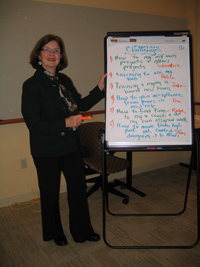 Creativity and Innovation requires process facilitation that inspires quality thinking and elicits quantity of ideas ~ all set in an open, supportive, creative climate / environment. Kells Associates will design an Innovation Meeting to meet the needs of your team. We are experienced in leading creative sessions to follow up on Employee Satisfaction Surveys, for New Product Development ideas, and for Work / Cost Improvement Strategies.
Creativity and Innovation requires process facilitation that inspires quality thinking and elicits quantity of ideas ~ all set in an open, supportive, creative climate / environment. Kells Associates will design an Innovation Meeting to meet the needs of your team. We are experienced in leading creative sessions to follow up on Employee Satisfaction Surveys, for New Product Development ideas, and for Work / Cost Improvement Strategies.
CREATIVITY IN ACTION: Creative Problem Solving Techniques
Changing perspective, shifting paradigms, and visioning are all tools for future thinking. The creative problem solving process uses these tools for facilitating change. It enables people rethink and recreate everyday challenges into interesting, viable opportunities. It gives them the tools to be proactive and reengineer their areas going forward. Sid Parnes describes the process by suggesting . . . “we first speculate on what ‘might be’ . . . we sense and anticipate all conceivable consequences or repercussions . . . and we choose and develop our best alternative in full awareness”.
This action learning initiative will do just that. This two-three day program will be designed in a workshop format using experiential activities, small group discussions, case initiatives, and facilitation applications. The group will select relevant work related issues to illustrate “creativity in action.”
Topics for the program will include the following: